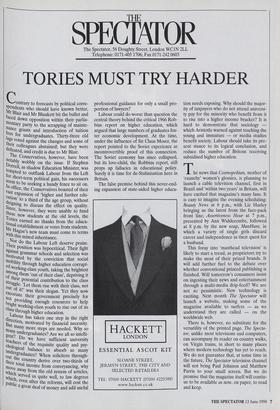The Spectator, 56 Doughty Street, London WC1N 2LL Telephone: 0171-405
1706; Fax 0171-242 0603
TORIES MUST TRY HARDER
Contrary to forecasts by political cone- sPondents who should have known better, Mr Blair and Mr Blunkett bit the bullet and faced down opposition within their parlia- mentary party to the scrapping of mainte- nance grants and introduction of tuition fees for undergraduates. Thirty-three old lags voted against the changes and some of their colleagues abstained; but they were defeated, and credit is due to Mr Blair. The Conservatives, however, have been notably wobbly on the issue. If Stephen D°rrell, as shadow Education Minister, was tempted to outflank Labour from the Left for short-term political gain, his successors seem to be seeking a handy fence to sit on. In office, the Conservatives boasted of their vast expansion of 'higher and further edu- cation' to a third of the age group, without doe. 'Ping to discuss the effect on quality. Since, however, they were unable to fund these new students at the old levels, the Tories earned no thanks from the educa- tional establishment or votes from students. Mr Hague's new team must come to terms with this mixed inheritance. Nor do the Labour Left deserve praise. Their position was hypocritical. Their fight against grammar schools and selection was Motivated by the conviction that social mobility through higher education corrupt- ed working-class youth, taking the brightest among them 'out of their class', depriving it of their potential contribution to the class struggle r c `Let them rise with their class, not out of it!' was their slogan. Yet they now excoriate their government precisely for Lilo! providing enough resources to help might working-class youth to rise out of its class through higher education. Labour has taken one step in the right direction, motivated by financial necessity. But many more steps are needed. Why so many undergraduates? Are we all so intelli- gent? Do we have sufficient university teachers of the requisite quality and psy- chological balance to absorb so many undergraduates? When solicitors through- °. ut the country derive over two-thirds of their total income from conveyancing, why raoye away from the old system of articles, which served us quite well, to law degrees which, even after the reforms, will cost the public a great deal of money and add useful professional guidance for only a small pro- portion of lawyers?
Labour could do worse than question the central theory behind the critical 1966 Rob- bins report on higher education, which argued that large numbers of graduates fos- ter economic development. At the time, under the influence of Sir Claus Moser, the report pointed to the Soviet experience as incontrovertible proof of this connection. The Soviet economy has since collapsed, but its love-child, the Robbins report, still props up fallacies in educational policy. Surely it is time for de-Stalinisation here in Britain.
The false premise behind this never-end- ing expansion of state-aided higher educa- Lion needs exposing. Why should the major- ity of taxpayers who do not attend universi- ty pay for the minority who benefit from it to rise into a higher income bracket? It is hard to demonstrate that sociology which Aristotle warned against teaching the young and immature — or media studies benefit society. Labour should take its pre- sent stance to its logical conclusion, and reduce the number of Britons receiving subsidised higher education.
The news that Cosmopolitan, mother of `raunchy' women's glossies, is planning to launch a cable television channel, first in Brazil and 'within two years' in Britain, will have excited that magazine's many fans. It is easy to imagine the evening scheduling: Beauty News at 6 p.m., with Liz Hurley bringing us the latest from the face-pack front line; Assertiveness Hour at 7 p.m., presented by Ann Widdecombe, followed at 8 p.m. by the new soap, ManHunt, in which a variety of single girls discard career and independence in their quest for a husband.
This foray into 'masthead television' is likely to start a trend, as proprietors try to make the most of their prized brands. It will add further fuel to the debate over whether conventional printed publishing is finished. Will tomorrow's consumers insist on ingesting their news and entertainment through a multi-media drip-feed? We are not so pessimistic. New technology is exciting. Next month The Spectator will launch a website, making some of the magazine available to surfers — as we understand they are called — on the worldwide web.
There is, however, no substitute for the versatility of the printed page. The Specta- tor, unlike most televisions and computers, can accompany its reader on country walks, on Virgin trains, in short to many places where modern technology has yet to reach. We do not guarantee that, at some time in the future, The Spectator television channel will not bring Paul Johnson and Matthew Parris to your small screen. But we do promise that the magazine itself will contin- ue to be available as now, on paper, to read and keep.


































































 Previous page
Previous page